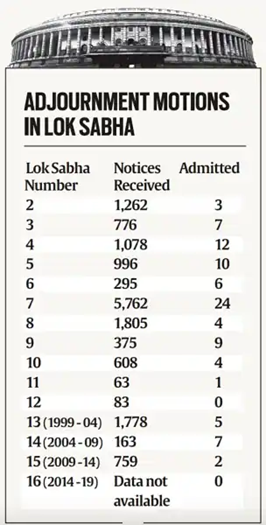Recently opposition parties moved an adjournment motion in the Lok Sabha, citing the need for urgent discussions on the ethnic violence in Manipur.
|
Normal Business |
Adjournment Motion |
|
To raise matters in the House, MPs must inform the presiding officers in advance |
The Scheduled business can be set aside by a procedural mechanism called the “adjournment motion”. |
|
It is available in both houses |
Only Lok Sabha has this provision as it involves an element of censure |
|
MPs inform to speaker of Lok Sabha and Chairman of Rajya Sabha in advance |
The Speaker has to decide whether to allow the MP to move the motion. |
|
This requirement ensures the government can collect information to respond to the MPs, the information of bills and budget in the agenda of the government is passed to MPs to prepare for debate. |
This Rule in Lok Sabha allows an MP to urge the Speaker to adjourn the House’s business “to discuss a definite matter of urgent public importance”. |
|
MPs can only discuss a matter that is on the day’s business. |
It results in the House dropping its scheduled list of business to discuss this urgent matter. |
The main issue with the adjournment motion is the reluctance of the Lok Sabha Speakers to allow these motions. Most Lok Sabha have spent less than 3% of their time on adjournment motions. The only exception being the 9th Lok Sabha which spent almost 5% (36 hours) of its time on adjournment motion.

|
About |
Lok Sabha |
Rajya Sabha |
|
Short duration Discussion- A debate without voting |
Rule 193 |
Rule 176 |
|
A motion with a vote |
Rule 184 |
Rule 167 |
|
To discuss urgent matter |
Adjournment motion |
Rule 267 |
|
Collective responsibility |
No confidence motion |
Not available |
References